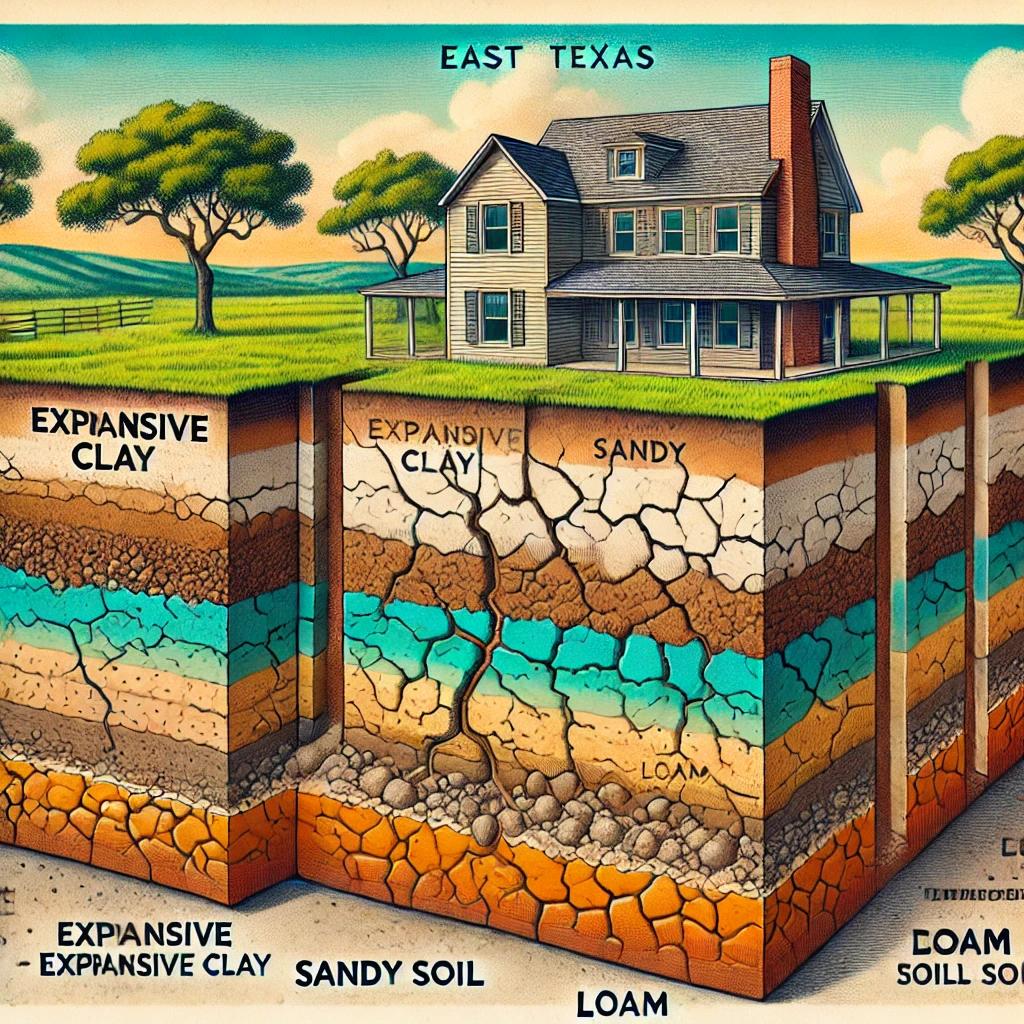When it comes to foundation stability, one of the biggest factors homeowners in East Texas must consider is the soil beneath their homes. Different soil types expand, contract, and shift at varying rates, which can put stress on foundations and lead to costly repairs.
Understanding the soil composition in East Texas can help you prevent foundation issues before they arise. Let’s explore how local soil conditions affect your home and what you can do to protect your investment.
The Most Common Soil Types in East Texas
The type of soil under your home has a direct impact on its foundation stability. Here are the most common soil types found in East Texas and how they influence your foundation:

1. Expansive Clay Soil
Expansive clay soil, often called “gumbo clay,” is one of the biggest culprits behind foundation problems in East Texas. This type of soil swells when wet and shrinks when dry, causing constant movement that can crack or shift a foundation.
Foundation Risks:
- Severe expansion in rainy seasons
- Shrinking and cracking during droughts
- Uneven settling and foundation shifting
Learn more: Foundation Repair Services
2. Sandy Soil
Sandy soil drains water quickly and doesn’t retain moisture like clay, making it less likely to expand and contract. However, this can cause instability if the foundation isn’t properly reinforced.
Foundation Risks:
- Soil erosion can cause sinking foundations
- Less support for heavy structures
- High risk of washouts during storms
Explore: House Leveling Solutions
3. Loam Soil (Ideal for Foundations)
Loam is a balanced mix of sand, silt, and clay. It holds moisture well but doesn’t expand or contract drastically, making it one of the best soils for foundation stability.
Foundation Benefits:
- Maintains even moisture levels
- Less prone to shifting
- Provides strong support for structures
Need a soil inspection? Request a Free Foundation Assessment
How Soil Movement Leads to Foundation Problems
Soil movement is one of the primary causes of foundation damage in East Texas. Changes in moisture levels—caused by seasonal rainfall, droughts, and improper drainage—can lead to:
- Cracked foundations due to expansion and contraction
- Uneven settling in areas with weak soil support
- Water damage from poor drainage leading to erosion
If your home is built on unstable soil, proactive foundation maintenance is essential.
Related service: Drainage Solutions for Foundation Protection
How to Protect Your Home from Soil-Related Foundation Issues
While you can’t control the type of soil your home is built on, there are steps you can take to minimize foundation problems:
Ensure Proper Drainage – Install gutters and downspouts to direct water away from your foundation.
Keep Moisture Levels Consistent – Use soaker hoses during dry seasons to prevent extreme soil shrinkage.
Reinforce Your Foundation – Consider pier and beam foundation support for homes built on expansive clay.
Schedule Regular Inspections – A foundation expert can detect early warning signs before costly repairs are needed.
Explore: Pier & Beam Foundation Repair
Get Expert Foundation Help in East Texas
If your home’s foundation has been affected by shifting soil, it’s crucial to act fast. At Rite-Way Foundation, we specialize in foundation repair in East Texas, offering expert assessments and solutions tailored to your soil type.
Call us today at [YOUR PHONE NUMBER] for a free foundation inspection!
Serving East Texas,
- Soil survey data from the United States Department of Agriculture’s Web Soil Survey
